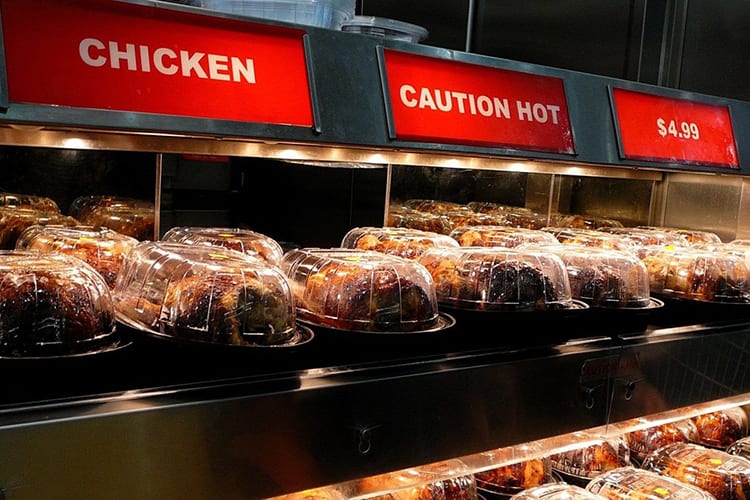
Chicksnatural/WikimediaCommons
Let's face it: sometimes there's nothing better than picking up a store-bought rotisserie chicken. However, are these cheap chickens good or bad for you? Well, nutritionists have finally answered that question!
Should You Eat Store-Bought Rotisserie Chicken?

Adobe/Simplemost
There's no doubt about it, America loves the rotisserie chicken. In fact, more than 950 million are sold from grocery stores every single year, according to the National Chicken Council data. "Rotisserie chicken is often very competitively priced and a lot cheaper than eating out," said Anne-Marie Roerink, founder of the grocery market research firm 210 Analytics. If you might think it's adults with families picking up these chickens, think again! Millennials and Gen Z purchase the most chickens per year, although all age groups enjoy them. Still, the question remains: are they healthy? In order to find out, Consumer Reports tested chickens from stores like Kroger and Costco, as well as those from restaurants like Boston Market.
First, they said people should stop assuming they are simple meat and nothing more. "You can't assume that all rotisserie chicken is just a plain cooked chicken," Consumer Reports nutritionist Amy Keating said. "Essentially, all rotisserie chickens are enhanced with a solution [injected into the bird] to keep the birds moist and tasty," agreed Tom Super, senior vice president of communications for the National Chicken Council. However, enhanced chickens are only the beginning...
Both Good And Bad

Tsui/WikimediaCommons
Taking a look at the packaging can help determine if you should eat the chicken or not. For instance, a "raised without antibiotics" means the bird did not receive any harmful injections while raised. Meanwhile, "organic" means that farmers fed the chicken organic-certified food and had plenty of space outside to roam around. So, if you're looking for a healthier option, make sure to err on the side of antibiotic-free and organic, if possible. Unfortunately, stores with less than 20 locations don't have to put the nutrition information on the packaging. So you will need to ask the deli manager for the information to make sure it's not high on sodium or other harmful ingredients.
Wondering when you should pick up a chicken? Well, Roerink explained that the best selection of store-bought rotisserie chicken comes in the evening, during the peak hours. "Most stores buy the broiler chickens [used to make rotisserie chickens] completely separately from the fresh whole chickens they sell in the meat department," Roerink added. What's the difference? Well, the rotisserie chickens are usually a bit smaller than the uncooked, whole chickens.
If you've picked up the right kind of chicken for you, but can't finish it, don't throw it away! It will keep in the refrigerator for up to four days. You can also freeze it for up to four months. After that, it will likely lose its flavor.
Sources: Consumer Reports, The Takeout.



